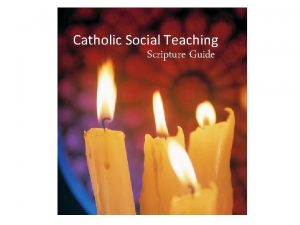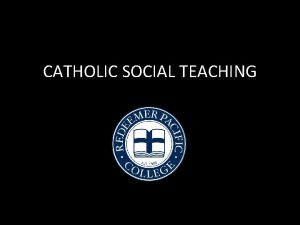Catholic Social Teaching Solidarity Solidarity Whilst solidarity has






- Slides: 6

Catholic Social Teaching Solidarity

Solidarity • Whilst solidarity has always been a key principle in Catholic social teaching, the encyclicals of Pope John Paul II provided us with a contemporary understanding especially in Sollicitudo Rei Socialis – “Social Concern” (1987). • We are all one family in the world. Building a community that empowers everyone to attain their full potential through each of us respecting each other's dignity, rights and responsibilities makes the world a better place to live. 1 • Solidarity "is not a feeling of vague compassion or shallow distress at the misfortunes of so many people, both near and far. On the contrary, it is a firm and persevering determination to commit oneself to the common good; that is to say to the good of all and of each individual, because we are all really responsible for all” 2 • The key to a complete understanding of the Catholic social teaching principle of solidarity is within the context of the dignity of the human person, the common good, subsidiarity and concern for the poorest.

Solidarity and the school • Catholic schools have always been involved in charitable and social justice action however, our contemporary understanding challenges us to ensure the school board: • has a planned and structured approach to charitable works, aligned to the mission of the Church and the local community context. • addresses equity and justice through its policies, procedures and programs • gives agency to staff, students and families in its decision-making and this agency is reflected in its policies, procedures and programs. 3

Scriptural reflection A reading from Paul’s first letter to the Corinthians [1 Corinthians 12: 12 -26] 4 One Body, Many Parts As a body is one though it has many parts, and all the parts of the body, though many, are one body, so also Christ. For in one Spirit we were all baptized into one body, whether Jews or Greeks, slaves or free persons, and we were all given to drink of one Spirit. Now the body is not a single part, but many. If a foot should say, “Because I am not a hand I do not belong to the body, ” it does not for this reason belong any less to the body. Or if an ear should say, “Because I am not an eye I do not belong to the body, ” it does not for this reason belong any less to the body. If the whole body were an eye, where would the hearing be? If the whole body were hearing, where would the sense of smell be? But as it is, God placed the parts, each one of them, in the body as he intended. If they were all one part, where would the body be? But as it is, there are many parts, yet one body. The eye cannot say to the hand, “I do not need you, ” nor again the head to the feet, “I do not need you. ” Indeed, the parts of the body that seem to be weaker are all the more necessary, and those parts of the body that we consider less honorable we surround with greater honor, and our less presentable parts are treated with greater propriety, whereas our more presentable parts do not need this. But God has so constructed the body as to give greater honor to a part that is without it, so that there may be no division in the body, but that the parts may have the same concern for one another. If [one] part suffers, all the parts suffer with it; if one part is honored, all the parts share its joy.

Doing theology See • What examples of solidarity do you observe within our school community? • Are we able to identify those individual and families who may be struggling? • What policies, procedures and programs specifically take into account the challenge of solidarity? Judge • “…so that there may be no division in the body, but that the parts may have the same concern for one another. If [one] part suffers, all the parts suffer with it; if one part is honored, all the parts share its joy. ” • What does this scriptural passage mean for the school board in providing a service to the school community? • What can be drawn from the Catholic faith tradition to aid in the discernment on this issue? 5 Act • How, in a spirit of solidarity, might we reach out and assist to those families who may be struggling? • Considering what we already do well how might we build on this in the spirit of solidarity? • Perhaps the board could audit its policies and procedures to ensure they “addresses equity and justice" 6?

References 1 Sollicitudo Rei Socialis – “Social Concern” (1987) Pope John II 2 1 Cor 12: 25 -326 (The New American Bible, Revised Edition) 3 Continuous Improvement Framework for Catholic Schools p 8










